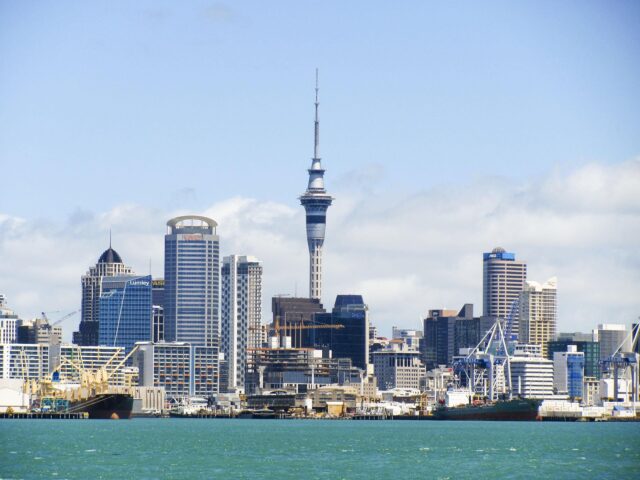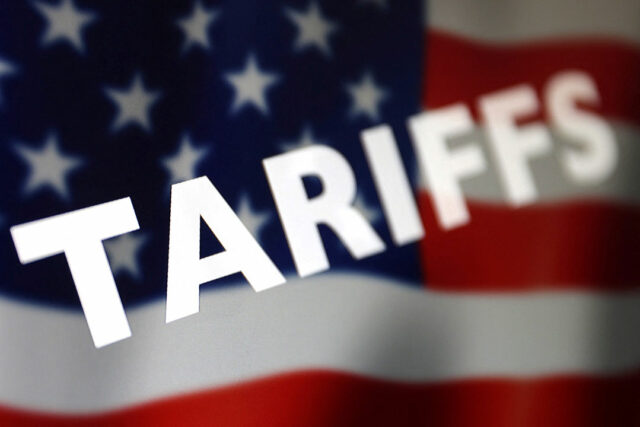By Justine Irish D. Tabile and Aubrey Rose A. Inosante, Reporters
THE PHILIPPINE government is hopeful that it can still negotiate for a lower US tariff rate ahead of the Aug. 1 deadline as President Ferdinand R. Marcos, Jr. heads to the US next week.
At the same time, analysts said the Philippines may consider increasing import quotas for US pork, poultry and corn during negotiations.
“Actually, with the 20%, we are still lower than the neighboring countries. It is not something that we expected, but we are still at the negotiating table,” said Trade Secretary Ma. Cristina A. Roque in a July 11 interview that will be aired on Thought Leaders with Cathy Yang on One News on July 17.
“It is hard for us to speculate at this time. We cannot give any information yet because there’s really nothing yet until we get to talk to our counterparts,” she added.
Ms. Roque and other trade officials will return to Washington this week to hold further negotiations on tariffs. Mr. Marcos is scheduled to visit Washington from July 20 to 22.
This after US President Donald J. Trump hiked the planned tariff on Philippine goods to 20% from the 17% previously announced in April.
“Having the president there is always something positive and something that we can really look forward to… We still have to wait and see how everything will unfold,” Ms. Roque said.
Asked if the Philippine government is still targeting zero tariff, Ms. Roque said it is difficult to discuss ahead of this week’s negotiations.
“Our team is really fighting for all our exporters, and we really hope to get the job done.”
Ms. Roque said, “everything is on the negotiating table,” including a free trade agreement (FTA) with the US.
“Any FTA is always good for the country, especially because it would really encourage and strengthen the trade between the US and the Philippines,” she said.
HIGHER QUOTAS?
Former Tariff Commissioner George N. Manzano said the US may ask the Philippines to raise quota allocations for pork and poultry imports.
“We will have to open. We have to buy more from the US. The US will ask us to give them a higher quota allocation to pork and poultry imports,” he told BusinessWorld via phone interview over the weekend.
As of April, the latest data from the Department of Agriculture showed the country imported a total of 14.03 million kilos of pork from the US. The Philippines also imported 43.36 million kilos of chicken, 18,544 kilos of duck and 29,088 kilos of turkey.
Pork imports under the minimum access volume allocation system enjoy a lower tariff of 15% compared to the regular rate of 25%.
Mr. Manzano said the Trump administration may also require more access to the Philippines’ pharmaceutical market.
If negotiations are successful, the US tariff on Philippine goods may go down to 10%, which would be the best case.
However, he said Mr. Marcos should also ensure that semiconductors, which are one of the country’s top export products, will be spared from Mr. Trump’s tariff threats.
Mr. Trump has said he will announce tariffs on semiconductors soon.
Calixto V. Chikiamco, president of the Foundation for Economic Freedom, urged the government to abolish quotas and tariffs on US goods, arguing that they benefit criminal syndicates and inflate food prices.
“For example, why impose a quota on US corn and slap them with 50% tariffs if they are out quota? Let US corn come in here at minimal tariff to lower the price of chicken and pork,” Mr. Chikiamco said in a Viber message.
Meanwhile, John Paolo R. Rivera, a senior research fellow at the Philippine Institute for Development Studies, said Mr. Marcos should prioritize tariff relief for key exports like electronics, garments, and agri-based goods.
“Just as important is making the case that the Philippine is a reliable US partner in critical supply chains like semiconductors and clean energy where trade cooperation should be strengthened, not penalized,” he said in a Viber message.
Mr. Rivera urges Mr. Marcos to push for clearer, rules-based trade treatment to restore investor confidence and avoid future shocks.
Meanwhile, Jonathan L. Ravelas, a senior adviser at Reyes Tacandong & Co., pointed out that “reciprocity” is crucial to secure a lower tariff from the US.
“We need to take advantage of US agriculture. Particularly, wheat and soybeans. Which are used primarily on feeds. If we are able to import cheaper this will help his food security,” Mr. Ravelas said in a Viber message.
‘DOWNSIDE SURPRISE’
The US imposing a 20% tariff on Philippine exports seen as a “downside surprise,” given expectations of a trade deal between the two countries amid a small bilateral trade deficit, MUFG Global Markets Research said in a report on July 11.
“The 20% headline tariff rate for the Philippines is still lower relative to the rate announced for other countries including Thailand, Indonesia and Malaysia, although now at the same rate as Vietnam,” the bank said.
MUFG said the Philippines’ exports of value-added to the US is “quite small” at just 1.3% of gross domestic product (GDP) for the goods sector, and 4% of GDP if services are included.
“Even if the Philippines offers import meaningful tariff cuts to the US in upcoming negotiations, the competition with domestic industry may be relatively limited,” MUFG Global Markets said.
For her part, Philippine Institute for Development Studies Emeritus Research Fellow Rafaelita M. Aldaba said if the US maintains the 20% tariff on the Philippines, this could result in heightened competitive pressures from Vietnam.
“Prior to the tariff increase from 17% to 20%, the Philippines effectively leveraged its relatively high exemption coverage and comparatively lower tariff rate to attract investments diverted from businesses seeking tariff-safe production sites,” she said in a Viber message.
“However, with both the Philippines and Vietnam now facing an identical 20% tariff, investors will closely scrutinize other critical determinants such as infrastructure quality, cost structure, industrial ecosystem depth, workforce skills, and governance efficiency,” she added.
Ms. Aldaba said that it will be a challenge for the Philippines to compete, as Vietnam already operates at a significant scale in sectors experiencing relocation and supply-chain shifts.
“Philippine exporters will encounter heightened competitive pressures from Vietnam, potentially constraining export growth, industrial expansion, and job creation,” she said.
“Given the country’s relatively modest export base and limited industrial depth, it will be challenging for the Philippines to swiftly capitalize on trade-diversion opportunities arising from global supply-chain realignments,” she added.
However, Ms. Aldaba said that the 20% is not the “worst-case scenario” and can still be mitigated through proactive policy measures.
“To successfully capture trade-diversion opportunities and bolster economic resilience, the Philippines must adopt aggressive strategies aimed at export diversification and value upgrading,” she said.
In particular, she said that the country must make targeted investments in logistics and infrastructure, industrial depth expansion, and workforce skilling.
“The extent to which the tariff increase becomes a severe economic setback or remains a manageable challenge depends significantly on how swiftly and decisively the Philippines implements targeted structural reforms and industry-specific strategies,” she added.










